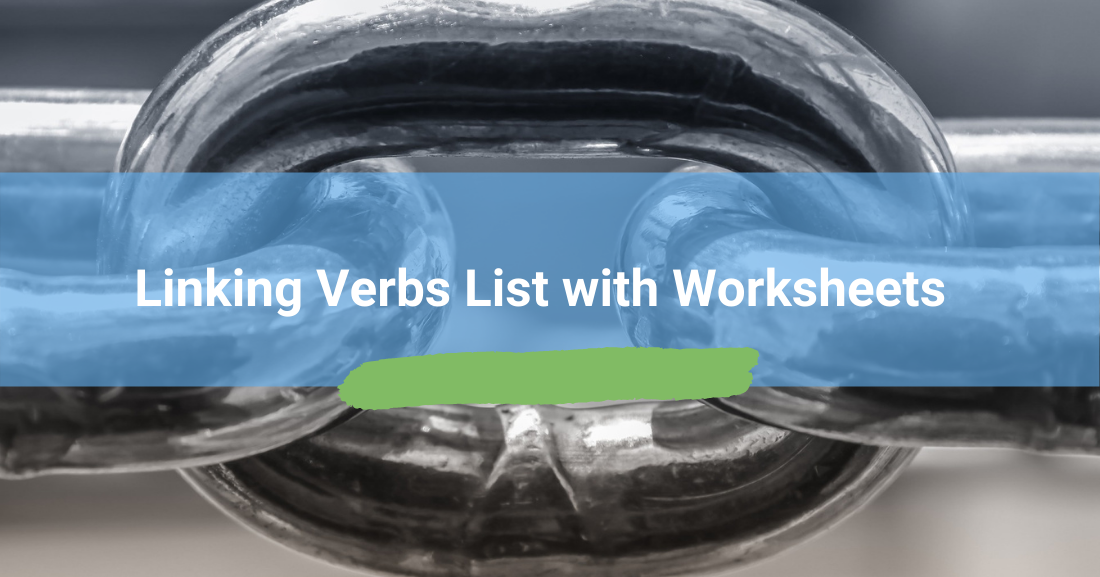In this article, we will discuss a type of verb that describes a state of being. These verbs are referred to as Linking, Helping, or Auxiliary verbs. Unlike typical verbs, these “to be” verbs don’t have to denote action and don’t have any meaning on their own. These verbs (linking verbs) gets their name because they connect the subject with the rest of the sentence.

When there is a “to be” verb, the subject is linked to another word in the predicate. For example, “I am tired.” In this example, the linking verb is “am” and it links the subject “I” to the adjective “tired.”
True/Primary Linking Verbs
Certain verbs are always used as linking verbs. These verbs are considered to be “true” or “primary” linking verbs. These are the verbs, “be,” “do,” and “have.” These verbs always perform a linking function in a sentence. The verb “to be” is a popular primary linking verb. There are various forms of the verb “to be.”
Forms of "to be"
- Am
- Is
- Is being
- Are
- Are being
- Was
- Was being
- Were
- Has
- Has been
- Have been
- Will have been
- Had been
- Are being
- Might have been
Forms of "to become"
- Become
- Becomes
- Became
- Has become
- Have become
- Had become
- Will become
- Will have become

Other Linking Verbs
Various verbs can be used as either an action verb or a linking verb, depending on the context in which they are used. These verbs could be a bit tricky to spot. Some popular linking verbs are:
- To feel
- To appear
- To seem
- To remain
- To smell
- To stay
- To sound
- To grow
- To continue
- To taste
- To turn
- To prove
When these verbs express a state of being, they can be considered as linking verbs. Here are a few examples:
- I feel close to my pets.
- The politician appeared flustered.
- I remained confused even after the explanation.
- That sounds like a good idea.
- I grew hungry as time passed by.
- I continue to think the world of my English teacher.
- This drink tastes delicious.
- Our best efforts only proved futile.
As mentioned before, these verbs could refer to an action or a state of being, depending on the context they are used. For example: “Grandma allowed me to taste the pie.” In this case, the verb ‘taste’ is an action. In the following example, the verb ‘taste’ expresses a state of being and is used as a linking verb. “The pie tastes delicious.” Here is another example:
“Roger appeared at the door.” - Appeared here is an action.
“Roger appeared troubled.” - Appeared here is a state of being, Linking.
Additional Resources (Worksheet Roundup)
- Auxiliary Verb Can - Elementary
- Gap-fill Story with Auxiliary Verbs - Elementary
- Speaking Activity: Modal/ Auxiliary Verbs - Elementary, Pre-Intermediate, Intermediate
- Auxiliary Verbs Gap Filling - Elementary, Pre-Intermediate
- Auxiliary Verbs PowerPoint - Elementary, Pre-Intermediate
- Helping (Auxiliary) Verbs - Pre-Intermediate
- Question Tags - Pre-Intermediate, Intermediate
- JC'S Basic Guide for Auxiliary Verbs - Intermediate, Upper-Intermediate Advanced
To learn more about teaching sentence structure continue reading How To Teach Sentence Structure
P.S. If you enjoyed this article, please help spread it by clicking one of those sharing buttons below. And if you are interested in more, you should follow our Facebook page where we share more about creative, non-boring ways to teach English.







